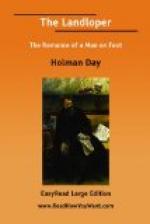The water had spread the ink and spotted the paper, but Farr was able to decipher the missive. He read aloud:
“’My head has grown bad since my husband died. It is grief, the awful heat, the work at the looms. They said if I would give my little girl away she could go to the country and grow well. But I could not give her up for ever. I could not earn the money to send her to board. I could not earn the money except to buy us bread here in the tenement block. And my bad head has been telling me it’s best to kill myself and take her with me. So I kill myself before my head grows so bad that I might take away my little girl’s life. It belongs to her and I hope she may be happy. Will somebody take her and give her happiness? It is wicked to kill myself, but my head is so bad I cannot think out the right way to do. This is the key to the room in Block Ten.
“’Mrs. ELISIANE Sirois.
“‘Her name is Rosemarie.’”
Walker Farr finished reading and stared into the glittering eyes of the old man.
Etienne Provancher swore roundly and furiously—the strange, hard oaths that his ancestors had brought from the Normandy of the seventeenth century.
“So you shall see—it is as I have say.” He shook his fists again at the mill. Its open windows vomited the staccato chatterings of the myriad looms. “It chews up the poor people. Hear its dam’ teeth go chank—chank—chank!”
“The Gallic imagination is always active,” said Farr, joggling the key at the end of the cord and eyeing it with peculiar interest. “But in this case it seems to picture conditions pretty accurately. I wonder just what a visitor would find inside the door that this key fits!”
“You shall go tell them at the office of the mill,” commanded Etienne. “Tell them they have killed another. They will telephone for the coroner. I will give the paper and the key when he come.” He held out his hand. “It is the law.”
“I have a natural hankering—sometimes—to break the law,” affirmed the young man. “I feel that fatal curiosity of mine stirring again, Friend Etienne. I will send the coroner. But coroners love mysteries. If we give him the letter it will take all the spice out of this affair. Let’s make him happy—he can drag out the inquest and give his friends a long job on the jury.” He smiled and started away, shaking his head when the old man protested shrilly. “Better say nothing about this letter and the key. You’ll get into trouble for letting a stranger come in here and carry away evidence. Better keep out of the law, Etienne.” He grabbed the “No Trespassing” sign for a hand-hold and climbed over the fence. “I’ll come back and tell you, Etienne. But keep mum,” he advised.
“It is his smile—it makes me break the law,” mumbled the old man.
VIII
THE KEY TO A DOOR IN BLOCK TEN




